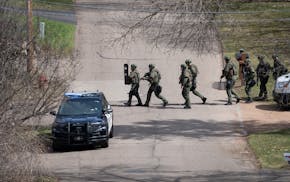Sarah Johnson's work begins long before the school bell rings.
First up is a meeting with a fellow teacher to talk about how a lesson was paced. Did you finish before the class was over? Did students have a chance to ask questions? Did they seem interested?
As one of nine teachers trained to evaluate first-year educators in St. Paul Public Schools, it's her job to identify the teachers who are excelling and those who are floundering. It's up to her to help them become better teachers. Never has that job been more crucial.
"I think all teachers are feeling a sense of urgency and a need to improve," Johnson said.
How teachers perform in the classroom is under unprecedented and intensifying scrutiny in Minnesota, where all of the state's 52,000 public schoolteachers will soon be subject to an annual evaluation for the first time.
Adding to the pressure, would-be teachers will have to pass a basic-skills test before they even set foot in the classroom. Teacher seniority protections also are under fire from lawmakers and parents eager to make educators more accountable.
"It feels like a number of issues that have been whispered about for years are now being turned into action," said Charlie Kyte, a longtime educator and former executive director of the Minnesota Association of School Administrators.
Minnesota is among a growing number of states grappling with how to tie teacher evaluations to student performance with a system that's meaningful and fair.
Until recently, most teachers across the country were evaluated when they were rookies, or when they were in trouble. Many teachers, principals, parents and lawmakers say that's not enough.
"In Minneapolis, if you're a nice person, don't hit the kids and don't show up for work drunk, you basically have a job for life," said Lynnell Mickelsen, co-founder of Put Kids First Minneapolis, a group pushing for reform in Minneapolis Public Schools.
Under pressure from her group and others to hold teachers more accountable and narrow the state's achievement gap between white and minority students, lawmakers last summer passed a law requiring annual teacher evaluations starting in 2014.
"We think having better teachers in the classroom helps other teachers, it helps kids and it helps parents," said Rep. Pat Garofalo, R-Farmington, chairman of the education finance committee and among many GOP leaders at the Capitol advocating the teacher accountability measures.
But some teachers are on the defensive. "What it effectively feels like is an attack," said Julie Blaha, president of the teachers union in Anoka-Hennepin, the state's largest school district.
One of the GOP's top targets is the state's powerful teachers union, with its insistence on contract provisions that have become rare in the private sector, such as seniority protections and a tenure structure that makes mediocre teachers hard to dislodge.
Minnesota was already feeling the heat from the U.S. Department of Education to require annual evaluations in order to receive a waiver from No Child Left Behind, a federal mandate that would have required all Minnesota students to be 100 percent proficient in English and math by 2014.
Under the new state evaluation law, 35 percent of a teacher's evaluation must gauge student achievement as measured by tests. That requirement represents a radical change for most Minnesota school districts, which don't rely on test scores to measure a teacher's value.
Other states have struggled to assess teachers who don't teach a grade level or a subject that has standardized tests. That will likely be a challenge here, too.
"How do you evaluate a school nurse?" asked Randy Keillor, a longtime St. Francis County educator. "What about an art teacher or a music teacher?"
Keillor is one of 35 members of a statewide task force that has just started to develop a teacher evaluation process for Minnesota schools to adopt by 2014.
"The ultimate goal here is to come up with a framework that a school can adopt if they want," said Mary Cathryn Ricker, a St. Paul teacher and co-chair of the work group, which is starting to look at what other states have done. "There a lot of blanks to be fill in."
Growing nationally, locally
The teacher reform effort has gained momentum across the country, fueled by an onslaught of research that shows how a good teacher can make or break a student's academic career.
Nationally, only 15 states required annual teacher evaluations in 2009, according to the Teacher Quality Council, a D.C.-based education research and policy group. Today, 24 states including Minnesota require annual evaluations.
Some education advocates say coming up with a strong teacher evaluation system is key to improving performance.
'If your classroom is spotless and your instruction is strong, but no one is learning, that's a problem," said Sandi Jacobs, the council's vice president.
Most Minnesota schools already have some form of teacher evaluations in place, but most don't penalize tenured teachers when students don't perform well.
St. Paul Public Schools is in the second year of a program in which Johnson and eight other teachers review probationary teachers, offering coaching and counseling as needed. It's expected to be expanded to tenured teachers. Minneapolis is in the second year of a pilot program that factors in student performance in teacher evaluations. Osseo Area Schools have added their own touches to Q Comp, a 2005 state program that provides extra pay for teachers when students perform well. Tenured teachers get annual evaluations.
Bad reviews are rare
But just because a teacher is evaluated doesn't mean struggling ones are identified. For years, Minnesota has been cited for its failure to identify and dismiss low-performing teachers.
The state's weak teacher-quality policies were one of the reasons the state initially lost out on the federal grant competition, called Race to the Top.
Some evidence suggests that most teachers tend to get rated above average. Between 2000 and 2010, Minneapolis Public Schools annually dismissed fewer than 3 percent of its teachers for poor performance, effectively giving the other 97 percent top marks, according to the district.
In recent years, questions have also arisen about the effectiveness of the performance-based Q Comp program. In 22 school districts whose Q Comp practices were examined by the Star Tribune in 2009, more than 99 percent of the teachers in the program received merit raises. Only 27 of the roughly 4,200 teachers eligible did not get a pay raise.
If it's challenging to accurately evaluate teachers, it can be equally daunting to fire the bad ones. A 2010 Star Tribune investigation found that few Minnesota teachers were ever fired for poor performance. Rather than endure an expensive and contentious dismissal process, school districts instead turned to a patchwork of other methods to remove low-paying teachers, including paying them off.
It's an ongoing problem with no easy answers, Kyte said.
"How do you change the system in a way that's fair to teachers while at the time gets to the core problem -- making sure your best people are honored and your poor performers are corrected or removed?" he asked.
Keillor said during the 34 years he taught school, he was evaluated twice: once on the last day of school just before the bell rang.
"What kind of world do we live in where we need a law to tell the boss to evaluate their employees?" he asked.
Beyond the evaluations, teachers are grappling with a GOP-backed effort to remove seniority protections under current state law and replace it with a system that also considers licensing and performance at layoff time. Gov. Mark Dayton has already signed a bill requiring aspiring teachers to pass a basic-skills test before they start teaching in public schools. Last year, he approved legislation opposed by Education Minnesota, the statewide teachers union, that makes it easier for those without teaching degrees to enter the profession.
The new laws spell big changes for Minnesota's teachers, including Katy Smith of Winona, named the state's teacher of the year in 2011.
"It's like having 48 pingpong balls coming at you at once," she said.
Kim McGuire • 612-673-4469
13-year sentence for unlicensed driver who fatally hit motorist while fleeing police in Oakdale

Man killed in Minnetonka by law enforcement started gun battle with deputies, BCA says

FAFSA completions in Minnesota drop amid flawed efforts to update form

Wisconsin Republicans ignore governor's call to spend $125M to combat 'forever chemicals'
